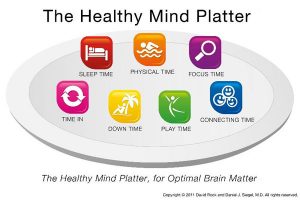The Healthy Mind Platter

Would you ever dream of not brushing your teeth?
Why are you not brushing your brain?
Below I am introducing David Rocks and Daniel Siegels Healthy Mind Platter as a wonderful way of organizing your life from a brain-hygiene perspective.
Has it ever occurred to you not to brush your teeth daily? Why not? I am asking you now not to brush your teeth for the whole of next week how does that make you feel? Resistant? Almost aghast? What is so curious is that nobody thinks of the importance of brushing your brain (as Siegel would say)! Even though our brain is the most important organ when it comes to creating a healthy and happy life for ourselves, brain hygiene is a novelty. The Healthy Mind Platter will give you an overview over the different ways our brains need attention. Except for mindfulness (Time In), you will not be able to implement each one of those activities every day; but seeing this platter as a weekly menu to scatter throughout the week as broadly as possible, will satisfy your brain’s needs.
Before I give the stage to Rock and Siegel, I want to clarify a point I find important, and which is not part of The Mind Platters thinking. Time In (see below) could also be called meditation or mindful time. In my view, this takes a particular place among all the items of the menu. Meditation or mindfulness are not a practice or activity we do an hour or so a day. They are a fundamental attitude towards living, which fosters integration, harmony and health. They are in fact about being rather than doing. While you will be doing all the other mind activities on the platter menu, Time In is about being, and forms the basis for successful implementation of all other menu items. In other words, what counts is how you do what you do whether in doing what you do you are non-reactive and grounded in being, or on autopilot and not grounded in being. This is a central concern of health and spiritual realization not to be missed.
I often get the question from students, how long they have to be mindful every day? Given what I just explained about being versus doing, with increasing practice experience a mindful attitude towards life will increasingly become the default mode of being. One has to keep in mind that the widespread autopilot attitude most people live by is one of the most altered states of consciousness you can imagine, even though it seems to arise so spontaneously during the transition from childhood to adulthood.The mindful non-reactive attitude is in fact the most effortless and natural of states. Once the brain is rewired through consistency of mindful practice and orientation, it is the autopilot mode that will subjectively feel exhausting. Being mindful seizes to be an effort and an exceptional state, but it becomes the effortlesss default way of being.








